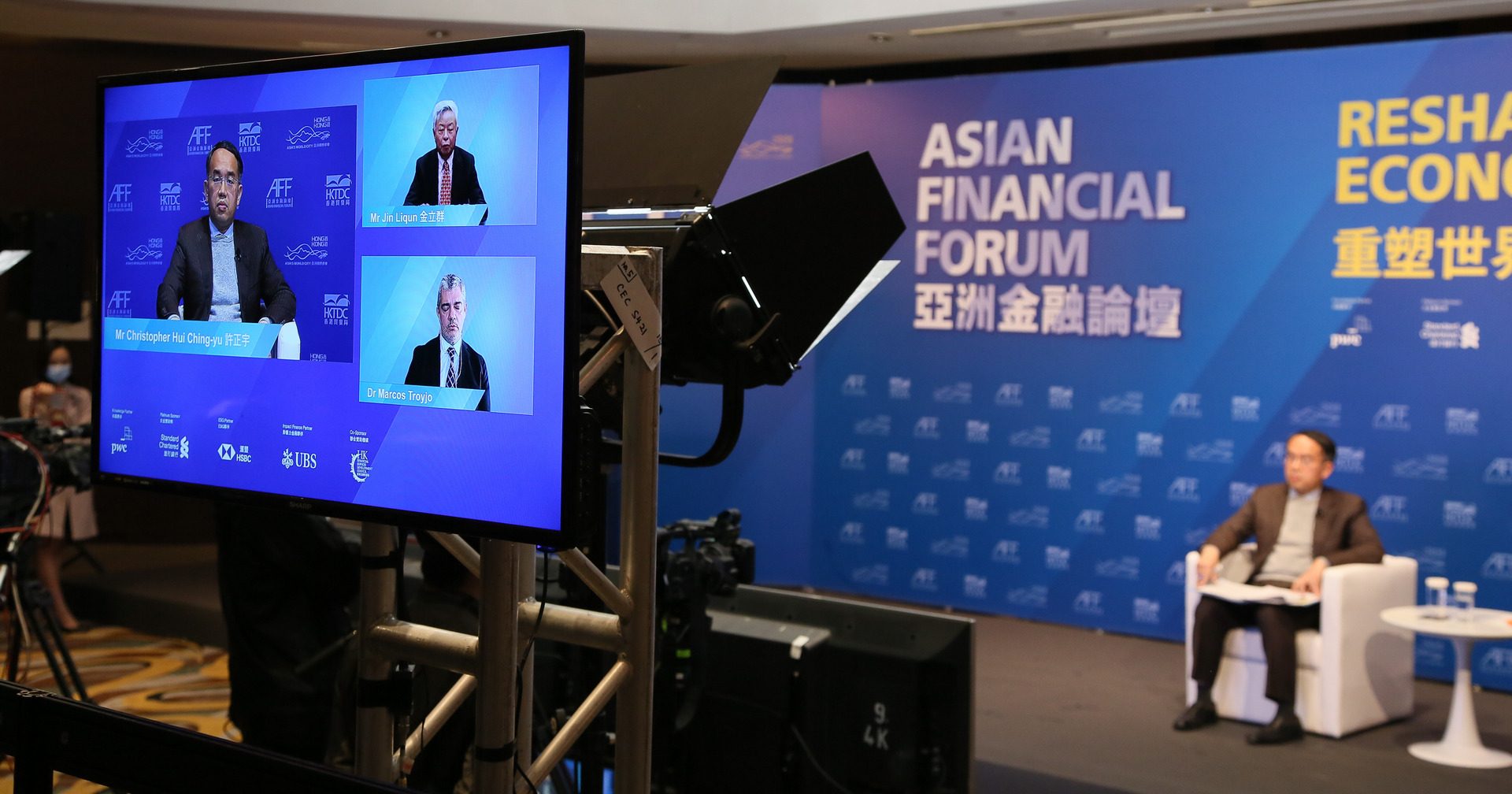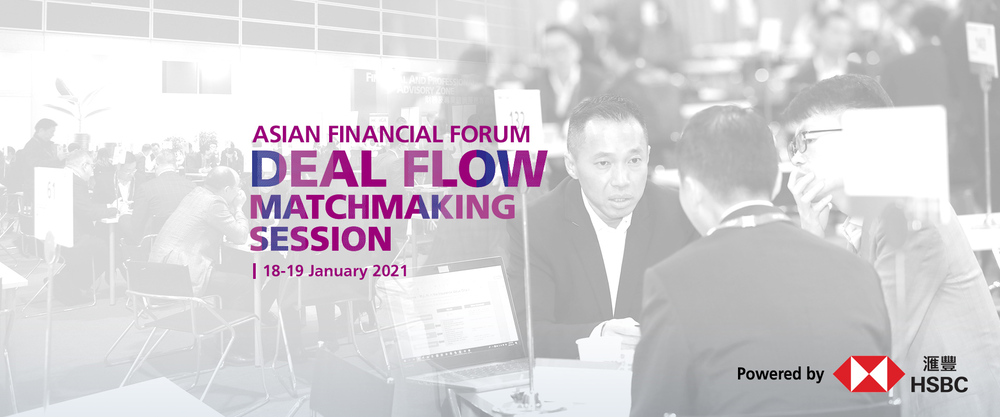On 18-19 January 2021, Asian Financial Forum was conducted online – here is why this event shook the world of the global business.

Russtroyconsulting is a traditional participant of the Asian Financial Forum. This is a unique event, literally one of the backbones of the global market; technically, it is concentrated on Asian markets… but in fact this is the region where powers are accumulated that are capable of having (and indeed have) the most extensive impact on global markets. The AFF is the place where global business leaders meet to exchange opinions, bring insider information up to date, consider multiple investment projects.
This year, this biggest event was held online for the first time. The AFF-2021 motto (Reshaping World Economic Landscape) very accurately reflects the specific character the Forum’s program that covers all challenges of the past year, with innovation projects related to the financial system’s functioning amidst the global “pandemic” restrictions being undoubtedly the focus of attention. Dmitry Evtin, Investment and Business Consulting Manager of HC Russtroyconsulting, conducted over 40 negotiation sessions at the AFF and rates the efficiency of such work format fairly high.
The AFF is the mirror of the global business. What are your impressions about the Forum?
“The world has definitely changed and there is no turning back to the past. Today, such or similar point of view is quite common, however, based on my experience, it is impossible to understand otherwise than through personal experience. The participation in the AFF-2021 became a turning point for me. You see… business, global financial systems immediately reacted to the pandemic – by new trends, separate inventions and whole courses of development. So, at this forum we could watch the image of the future global financial system being created. Honestly, I don’t think I will ever see something like that with my own eyes again. It is definitely a historical moment.”
What is happening?
“The world is disengaging from the globalism. Economies of certain countries will be likely becoming more and more closed. Although the international trade, trans-border projects will not go anywhere; I even think their number will grow, at least due to the general population growth, and thereto related increased consumption with gradual depletion of easily-accessible resources. But the growth driver will move to the area of online communications and digital technologies. Whoever owns information, owns the world? Believe me, up until now hardly anyone fully understood the meaning of this expression.”
Is digitalization speeding up?
“Not only is it speeding up, it’s shooting off into outer space. Soon not just the majority, but simply all negotiations, data exchange, decision-making on transactions of any level will be held online. It is not just transnational corporations being engaged into international business relations, but medium and small companies as well – and right now this tendency is rapidly growing inside covering separate individuals. Digital financial instruments are already globally available for purchase, sale and rent, like merchandize on regular online sites. It was clear that traditional pattern “the financial system is formed by transnational companies” was becoming history. Contemporary control tools are individual operation of financial instruments implemented on the basis of a mobile phone and blockchain technologies.”
Does that mean that the border closure does not hinder the international business?
“Penetration of the infosphere is growing exclusively fast (one of the best “symptoms” is the exponential growth of international trade participants) not in spite, but because of current drawdown of offline tools, border closure and agony of conservative globalism in general. Such a paradoxical mix, it would seem. All at once we can see the focus on isolation of national economies, growth of the international cooperation and increase in the number of global transactions participants. These changes are huge. Active market participants already understand everything, they prepare innovative instruments, build prosperity strategies, simulate possible achievement of dominance in new realia.”
What’s is Russia’s place in this process? And Primorye’s?
“Surprisingly, but I cannot say anything good on the first part of the question, but I was unexpectedly pleased to hear about the second one. Particularly in case of the AFF, there is a simple and representative criterium called AFF Deal Flow Matchmaking Session. It is one of the Forum’s most important tools that helps connect funds sources (investors) and transactions sources (investment projects) from all over the world. It is done through personal (now, of course, remotely) meetings, and meetings’ participants are picked up based on common areas of interest. On the AFF’s website, you can review the project list and the list of featured investors separately. So, there are 12 participants registered from Russia, but half of them are from Primorye. Unfortunately, our domestic business does not have any projects based on new inventions yet. Let’s hope for the next year.”
What can you say about the new format of the AFF in general?
“From the standpoint of an investment specialist, the new reality where a great amount of negotiations is transferred to the online mode looks very appealing and efficient. Modern formats imply a special communication zone and a pre-arranged list of participants. And each participant can choose business communication partners using multi-step filters, including selection by projects, their stages, amount of funding, regions, countries… basically, as flexibly adjustable set of parameters as you please. In my opinion, such an approach will allow millions of businessmen of any level to communicate in person.”

Brief Summary of AFF:
Most presented projects are dedicated to servicing of the currently forming global financial system of individual transactions and extra-bank payments, with the focus on technology that is conditionally similar to blockchain.
For example.
Project from Malaysia that was actively discussed at the Forum as a sort of “return to the gold standard”. The project founders developed a plan that allowed any market participant to purchase a digital analogue of gold with any bank of the world, use it for urgent payments (in small amounts, by telephone number) and easily convert it back to any convenient currency, thus bypassing trans-border currency exchange restrictions, via, of course, applications created for both Apple and Android eco-systems. Good bye, complex systems for bitcoin and its analogues conversion. Welcome, good old gold.
A similar scheme was developed by a US company, only for barter transactions… just like in the USSR at the time of its dissolution. This is basically it. Thousands of users and millions in revenue.
There are also lots of projects related to introduction of international payments into national payment systems (such as Sberbank Online). Put it more bluntly, the meaning of most of them is to let each “small” global trade participant use such network in the country of stay for payments.
Popular projects include online-service projects for supporting transactions at all stages, from reliable identification of parties to a transaction and goods to manufacture, payments, logistics, return warranties, etc., without a single offline operation.
There are some paramedical projects, and only for fighting COVID. Current works in the sphere of diagnostics and preventive treatment built as digital platforms aggregating inventions and fragmented information, as well as coordinating collective work of specialists around the world (including that intended for prevention of future threats).
Since all these world-changing projects are related to massive data flows in one way or another, there is a global request for preparation of relevant facilities to process them and creation of digital flow control systems.
For example.
Multiple datacenter projects – centerpieces, around which massive economic zones and New Cities are already being built. A similar project is now developed by Russtroyconsulting, so yes, we were very pleased to realize we hit the target (or at least very close to the target). Financial datacenter, information flow control center, DC and database park in the country – all these points were somehow mentioned for projects presented at the AFF. So, we negotiated with representatives of such centers from Singapore, Indonesia, Malaysia, Philippines. All of them are being built not just as “zones of priority development” or “free trade zones”, but rather as “zones of advanced digital technologies” built as part of a datacenter capable of processing and controlling financial flows. Interestingly, our point was confirmed as well. Any DC is an independent project with its own tasks. But because it is somehow or other integrated in the urban infrastructure, one of the side effects is the possibility of complete handover of control over city’s essential services to new digital technologies, practically without any extra costs.
